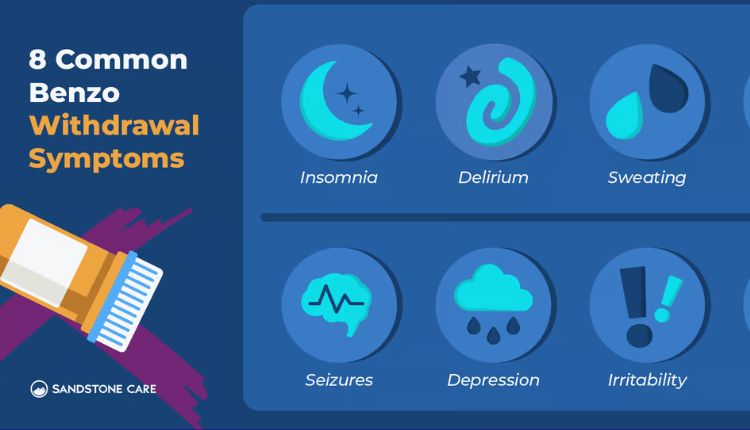Benzodiazepines, often referred to as “benzos,” are a class of medications prescribed to treat anxiety, insomnia, seizures, and panic disorders. They can be effective when used short-term and under medical supervision, but they also carry a high risk for dependence. People who take benzodiazepines regularly for an extended period may find themselves physically dependent on the medication — meaning stopping suddenly can lead to uncomfortable and sometimes dangerous withdrawal symptoms.
If you or someone you love is struggling, it’s essential to understand benzo withdrawal symptoms and how to navigate the process safely. Withdrawal can be severe, and in some cases life-threatening, making medical support crucial for a safe and effective recovery.
What Are Benzodiazepines?
Benzodiazepines are prescription medications that work by slowing activity in the brain and central nervous system. This produces a calming effect, which is why they are commonly prescribed for anxiety, panic attacks, or insomnia. Popular benzodiazepines include:
- Alprazolam (Xanax)
- Lorazepam (Ativan)
- Diazepam (Valium)
- Clonazepam (Klonopin)
While these medications can provide relief, long-term use can cause physical dependence. Over time, the body adapts to the drug, and suddenly stopping can cause withdrawal symptoms.
Why Benzo Withdrawal Happens
Dependence occurs because benzodiazepines affect the GABA receptors in the brain, which regulate feelings of calm and relaxation. When you stop taking them abruptly, the brain is left in a hyperactive state because it can no longer rely on the drug to maintain balance. This overactivity leads to a range of withdrawal symptoms that vary in intensity depending on the individual, the dose, and how long the medication has been used.
Benzo Withdrawal Symptoms: What to Expect
The withdrawal experience can be different for everyone, but there are common patterns and symptoms that most people experience. Understanding these symptoms can help you prepare mentally and physically for the process.
Physical Symptoms
Physical withdrawal symptoms are often the first to appear and may include:
- Headaches and muscle pain
- Nausea, vomiting, or stomach cramps
- Sweating or chills
- Rapid heart rate or palpitations
- Tremors or muscle twitching
- Insomnia or difficulty falling asleep
These symptoms can feel flu-like but are often more intense and persistent.
Psychological Symptoms
Because benzodiazepines directly impact brain chemistry, psychological withdrawal symptoms can be intense. Common experiences include:
- Severe anxiety or panic attacks
- Irritability and agitation
- Mood swings or depression
- Trouble concentrating or brain fog
- Intense cravings for the drug
These psychological effects are among the most challenging aspects of withdrawal, as they can persist for weeks or even months in some cases.
Severe or Dangerous Symptoms
In some cases, benzo withdrawal can lead to life-threatening complications, particularly if the drug is stopped abruptly after long-term or high-dose use. Dangerous symptoms include:
- Seizures
- Hallucinations or psychosis
- Delirium (severe confusion or disorientation)
- Suicidal thoughts
These symptoms require immediate medical attention. This is why detoxing from benzodiazepines should always be done under medical supervision.
Timeline of Benzo Withdrawal
The timeline of withdrawal can vary, but most people experience symptoms in phases:
- Early Withdrawal (6–12 hours after last dose): Rebound anxiety and insomnia often appear first.
- Acute Withdrawal (1–4 weeks): This is the most intense phase, with both physical and psychological symptoms peaking during this period.
- Protracted Withdrawal (1–12 months): Some people experience lingering symptoms, also known as post-acute withdrawal syndrome (PAWS), including mild anxiety, sleep problems, and mood fluctuations.
Factors That Influence Withdrawal Severity
Not everyone experiences withdrawal the same way. Several factors can make symptoms more or less severe:
- Type of benzo used: Short-acting benzos like Xanax tend to cause more intense withdrawal symptoms than long-acting ones like Valium.
- Dosage: Higher doses generally lead to stronger physical dependence and more difficult withdrawal.
- Length of use: The longer a person has been taking benzodiazepines, the more likely they are to experience severe symptoms.
- Individual health: Co-occurring mental health conditions, overall physical health, and genetics can all impact the withdrawal process.
Why Quitting Cold Turkey Is Dangerous
Many people make the mistake of stopping benzos suddenly, thinking it will speed up the process. Unfortunately, quitting cold turkey is dangerous and can trigger severe withdrawal symptoms, including seizures. A gradual taper supervised by a medical professional is the safest way to stop using benzodiazepines.
Medical Detox for Benzodiazepine Withdrawal
The safest way to navigate withdrawal is through a medically supervised detox program. These programs provide:
- Tapering plans: Slowly reducing the dosage to minimize withdrawal effects.
- Medical monitoring: 24/7 supervision to manage complications like seizures or severe anxiety.
- Medication support: Certain medications can help ease symptoms, such as anticonvulsants or non-addictive anxiety treatments.
- Emotional support: Counseling and therapeutic support to manage cravings and psychological challenges.
Post-Detox Treatment and Recovery
Detox is just the first step. After completing withdrawal, ongoing treatment is recommended to address the root causes of benzodiazepine use. Options include:
- Behavioral therapy: Cognitive Behavioral Therapy (CBT) helps individuals develop coping strategies and address anxiety without medication misuse.
- Support groups: Peer support can reduce feelings of isolation and provide accountability.
- Holistic care: Mindfulness practices, yoga, and nutrition support overall healing and reduce the risk of relapse.
The Importance of Professional Support
Trying to go through benzo withdrawal alone can be risky and overwhelming. Professional treatment programs provide safety, structure, and the tools necessary for long-term recovery. With proper medical care, the process becomes much safer and more manageable.
Final Thoughts
Understanding benzo withdrawal symptoms is a crucial step toward recovery. With the right medical guidance, gradual tapering, and comprehensive support, it’s possible to overcome dependence and regain control of your life. Treatment centers like Visalia Recovery specialize in safe, supervised detox and long-term care to help individuals achieve lasting sobriety.






